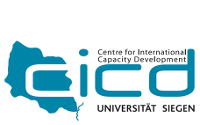European Researchers' Night 2022
ATHENA continuously supports students in their research endeavours. That's why we're celebrating this year's European Researchers' Night 2022 with a video about exciting student research projects at ATHENA partner universities. Each project is unique in its creativity, topic and nature - whether it is part of a Bachelor's, Master's or PhD programme or part of an EU-funded proposal. Together, the projects provide an insight into the opportunities available to students when European universities with a technical focus join forces.
From the Human-Robot Desk Interaction project to sign language translation and molecular dynamics simulations with deep learning algorithms to the development of an app to increase physical activity, the projects cover different areas and technologies. Selected projects are briefly presented below:
A Low-Cost Prototyping Framework for Human-Robot Desk Interaction
- Institution: Universität Siegen
- Project author: Henry Ugochukwu Odoemelem
- Project type: Master's thesis
- Study programme: M.Sc. Mechatronics
- Mentor: Kristof Van Laerhoven
- Project description: Many current human-robot interactive systems tend to use accurate and fast – but also costly – actuators and tracking systems to establish working prototypes that are safe to use and deploy for user studies. This work presents an embedded framework to build a desktop space for human-robot interaction, using an open-source robot arm, as well as two RGB cameras connected to a Raspberry Pi-based controller that allow a fast yet low-cost object tracking and manipulation in 3D.
VirtualSign
- Institution: Instituto Politécnico do Porto
- Project authors: Paula Escudeiro, Nuno Escudeiro, Tiago Oliveira
- Project type: VirtualSign started as a national research project, back in 2012, funded by FCT, the Portuguese research funding agency (VirtualSign and ACE projects); then it was funded by Erasmus projects (I-ACE, InSign) and now it is funded by Compete (ICHT project), a co-promotion industrial R&I funding program.
- Study programme: PhD in Informatics at Universidad Complutense de Madrid and Instituto Politécnico do Porto
- Mentors: Paula Escudeiro, Nuno Escudeiro
- Project description: VirtualSign is a system for the automatic bi-directional translation between sign and spoken languages. The VirtualSign system relies on a 3D avatar to translate from spoken to sign language and also translates from sign to spoken language. VirtualSign provides solutions to capture signs through data gloves and Kinect, other comparable projects only use a specific type of data gloves or use computer vision. The translation model is suitable for any language and has already implemented translation solutions for Portuguese, Slovenian, British English, German and Greek.
Acties - Be Active and Have Fun
- Institution: Univerza v Mariboru
- Project authors: Tina Časar, Teja Voglar, Tadej Leva
- Project type: Study programme
- Study programme: Media Communication
- Mentors: Katja Udir Mišič, Marijana Zelenik
- Project description: Acties is an application that attempts to address the declining physical activity and lack of motivation for physical activity among primary school children as a result of o the Covid-pandemic. The app motivates children to exercise and engage in physical activities that have been denied to them in homeschooling. It encourages interaction with other children, teachers and trainers and provides the latter with an overview of children's physical activity.
Applying SCRUM in a Physics II undergraduate course: effect on student progression and soft skills development
- Institution: Hellenic Mediterranean University
- Project authors: Manolis Lourakis, Konstantinos Petridis, Evangellia Triantafyllou
- Projekt type: Part of a PhD programme
- Study programme: PhD
- Mentors: Konstantinos Petridis, Evangellia Triantafyllou
- Project desctiption: This project studies learning difficulties under stress by using technology and modern pedagogy. It is well known that stress is the pandemic of our century. There are four types of stress, (a) time stress, (b) situation stress, (c) anticipatory stress, and (d) encounter stress. Stress can severely affect our learning ability. In this project, modern pedagogical and teaching approaches (Problem-based Learning, Project-oriented Learning, Flipped Classroom approaches, introduction of guppy notes approach, frequent testing approach) as well as existing and new technological tools are used that can be easily integrated into teaching in order to study and fight the stressor parameters in students and teachers.
B.E.A.T Balance Evaluation Automated testbed
- Institution: Università degli Studi Niccolò Cusano
- Project authors: Fabrizio Patanè, Stefano Rossi, Enrico Castelli
- Project type: Reserach project in the framework of Horizon 2020
- Project period: 24 months
- Mentor: Fabrizio Patanè
- Project description: The absence of standardised methodologies for the assessment of wearable exoskeleton performance still represents the main issue to overcome for their complete spread in real life. From this perspective, the project purposes to create the first benchmarking for robots in Europe. B.E.A.T. (Balance Evaluation Automated Testbed) aims at realising a testbed to benchmark the ability of exoskeleton in assisting static and dynamic balance
More exciting research projects are presented in the video linked above.


.png)
